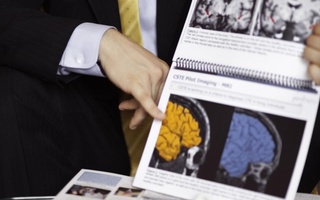Three panelists described current medical research and long-term goals to reform care and policy on athletic head trauma and concussions during a biannual symposium of the Harvard Society for Mind, Brain, and Behavior in Science Center C on Friday afternoon.
Presenting a photo of the brain of a 50-year-old diminished to the size of an infant brain, Boston University professor of neurology and pathology Ann McKee noted that early results from research into chronic traumatic encephalopathy—a neurodegenerative disease often caused by repeated hits to the head—have been alarming.
McKee directs BU’s Center for the Study of Traumatic Encephalopathy with Chris J. Nowinski ’00, a former All-Ivy linebacker and WWE wrestler. Repeated blows to the head from years of competitive sport have caused significant brain damage in more than 90 of the 150 brains they have in their database.
Following the discussion on research, Stephanie Morain, a graduate student in health policy at the Harvard Graduate School of Arts and Sciences, highlighted the difficulties of implementing concussion policies on local levels.
Right-to-play laws that would limit tackle football in certain age groups, Morain said, are not uniform across states and some areas are more resistant than others to reform.
During the question-and-answer session, Nowinski, who suffered multiple concussions in his career, added that coaches and doctors have perverse incentives not to diagnose their players with concussions.
“There are all sorts of incentive problems with medical care at the highest level,” Nowinski said. “You don’t get that job if you are a player advocate.”
Another problem, according to Nowinski, is players condoning and speaking publicly about intentionally failing baseline concussion tests.
“[Cheating the test] to me is not an ethical tragedy because these are adults signing up for a dangerous job,” Nowinski said. “They better not be trying to make it cool like Peyton Manning, when he is telling the press he cheats on his baseline test so kids do it [too].”
Community Events Co-Chair for HSMBB Daniel Z. Wilson ’14 said the topic’s recent popularity nationwide and on campus made it accessible to a wider audience.
“This seemed like the topic which was not too contained just in the world of neuroscience,” Wilson said.
—Staff writer David P. Freed can be reached at davidfreed@college.harvard.edu. Follow him on Twitter @CrimsonDPFreed.
Read more in College News
Students Share Stories of Experience as Undocumented ImmigrantsRecommended Articles
-
TIE SOCCER GAME WITH YALEIn the first intercollegiate game of the season, the University association football team played a tie with Yale at New
-
 Confronting the Concussion
Confronting the Concussion -
Ivy League Leads Trend in Concussion PreventionThe winds of change howling through the world of sports safety have become impossible to ignore. Traditional football has nearly been toppled by the gusts, and the winds’ next victim, hockey, lies just around the corner. Adding to the drafts is none other than our little Ivy League. The breezes began back in 2009, when the NFL was called out by Congress for not adequately protecting its players from the dangers of concussions and other head injuries.
-
 Concussed: Down and Out
Concussed: Down and Out













